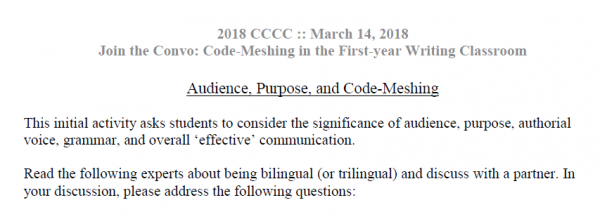Author Stella Wang
Terry, B (2014). Afro-vegan, Farm-fresh African, Caribbean & Southern flavors remixed. Berkeley, CA: Ten Speed Press. Find the book at worldcat.org/isbn/1607745313 E.g., Names of the dishes of African, Caribbean, and Southern soul food origins–chermula, dukkah, kelewele, maque choux, and tamales–in the… Continue Reading →
Graff, G. & Birkenstein, C. (2010). ‘Ain’t so/is not’: Academic writing doesn’t always mean setting aside your voice. In “They say/I say,” The moves that matter in academic writing (pp. 121-128). 2nd ed. New York: Norton. Find the book at worldcat.org/isbn/0393935841
Rockman, M. V. (2012). The QTN program and the alleles that matter for evolution: all that’s gold does not glitter. Evolution, 66(1), 1-17. Find this article at doi.org/10.1111/j.1558-5646.2011.01486.x
Analyzing excerpts of code-meshed academic papers (workshop) Stella Wang
Here is the main presentation used by presenters Whitney Gegg-harrison, Sarah Lamade, Stella Wang, and Suzanne Woodring at the Conference on Composition and Communication in March 2017. The full title of the presentation is : “Anyone Can Code-Mesh: Teaching and Tutoring… Continue Reading →
Van Mulken, M., & van der Meer, W. (2005). Are you being served?: A genre analysis of American and Dutch company replies to customer inquiries. English for Specific Purposes, 24(1), 93-109. Find the article at doi.org/10.1016/j.esp.2004.07.001
Pratt, M. (1991). Arts of the contact zone. Profession, 33-40. Find the article at stor.org/stable/25595469
Michaelis, S. M., Maurer, P., Haspelmath, M., Huber, M. (eds.) (2013). Atlas of Pidgin and Creole Language Structures Online. Leipzig: Max Planck Institute for Evolutionary Anthropology. Learn more at apics-online.info
Here is a handout used by Suzanne Woodring for part of her presentation “Code-Meshing and Rhetoric: Engaging Audience and Language Diversity” at CCCC 2018. It is an example of a brainstorming activity for students to do when writing a formal… Continue Reading →
Here is the activity handout used by Suzanne Woodring during her presentation “Join the Convo: Code-Meshing in the First-year Writing Classroom” at CCCC 2018.









